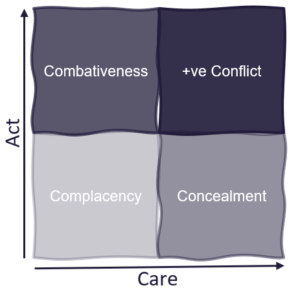The opposite of conflict is not peace … it’s complacency.
Okay sure, in the context of war, the opposite of conflict is peace, but for most of us, in our daily lives, the opposite of conflict is complacency.
This is best depicted in my model:
Complacency is when we just don’t give a hoot and we ignore what’s going on. Not caring and not acting is complacency in action – or rather inaction! Complacent people in organisations are those coasting, downplaying challenges and probably job hunting.
Combativeness is when we get involved in skirmishes whether we care or not. Combative people love a good fight but don’t have the best interests of anyone or anything at heart.
Concealment is when we do care but don’t speak up because we are afraid to, or we think we can’t make a difference. When we conceal what we know and what we value, we remain voiceless.
+ve Conflict is when we step up to the conflict because we do care and are willing to act. This is different to combativeness because it comes from a place of caring.
An organisation without conflict keeps its poor performers, never tries new ideas, doesn’t identify risks, can’t fully explore decisions and doesn’t listen to its employees.
Leaders who don’t know how to lean in to conflict encourage the fake harmony of concealment, which in turn will eventually give way to complacency.
Sure, conflict is hard, and we don’t want conflict for conflict’s sake, but there’s no progress without conflict.
Dissent needs to come to the surface. It will leak out anyway, in resignations, passive aggressive behaviour, undercurrents of resentment and overall stagnation, so find ways to explore dissent.
Consider these questions:
- Are you tempted to hire yes-people or do you want people who will speak up?
- How are people treated when they disagree?
- Are opposing opinions given consideration or they dismissed?
- Does the culture of your organisation reward complacency or concealment?
- Is combativeness addressed?
- Is fake harmony celebrated?
- Do you invest time in having the hard conversations?
Conflict and success are linked; there’s no escaping it. You want a culture where positive conflict is encouraged and complacency is weeded out. Let’s get better at conflict!
=====
Here are some ways I can help:
- I can speak at your conferences and events.
- I can train your teams in negotiation and conflict management.
- I can facilitate collaborative agreements with your leadership teams.
- I can provide coaching to help you improve your negotiation and conflict skills.
